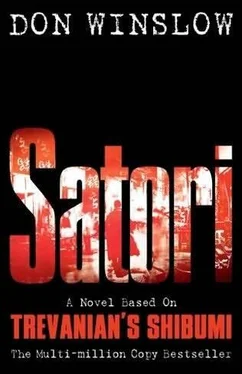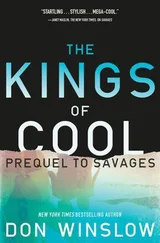Dining accomplished, Signavi led them to a large barracks tent surrounded by concertina wire.
His proximity sense woke him.
He lay still and listened to the sharp click-click as the wirecutters snipped the fence, then to the sound of a man crawling.
Bay Vien was sound asleep on his bed by the tent wall.
Nicholai dove just as the blade slashed through the tent. He knocked Bay off the bed onto the floor, then got up and went through the tent door.
The would-be assassin was already running back toward the fence.
A klaxon sounded and a searchlight swept the ground. Nicholai heard Alsatian dogs bark and then one burst across the stockade ground after the man. The man leapt for the fence and became entangled in the concertina wire. He twisted in the wire, a grotesque acrobatic act, as the machine-gun bullets hit him.
Signavi, clad in satin pajamas, a pistol in his hand, ran out, and a moment later Bay Vien came out of the tent and looked at the corpse hanging from the fence.
“Viet Minh,” Bay said. He turned to Nicholai. “You saved my life, Guibert.”
“Just looking out after my interests,” Nicholai answered. He walked back into the tent and lay back down.
Bay came in. “I’m in your debt,” he said.
“Forget it.”
“I won’t,” Bay said. “It’s a matter of honor.”
Nicholai understood.
COLONEL YU KNOCKED on the door of Liu’s office and received permission to enter.
Liu looked up from the stack of papers on his desk. “Yes?”
“The Viet Minh agent who was supposed to meet Hel was killed.”
“Ah.”
“So Hel didn’t make the rendezvous.”
“Obviously.”
“There’s a report,” Yu said, “unverified, that he went with the Binh Xuyen.”
“Stay on top of it,” Liu ordered.
Yu left the room deeply troubled. If Hel was with the Binh Xuyen, he was either a prisoner or had willingly betrayed him.
THE PLANE FOLLOWED the Mekong south.
Nicholai watched out the window as the broad brown river flowed out of the mountains down into the plains of Cambodia, then broke into multiple tributaries as it entered the delta in southern Vietnam.
Looking down at the endless stretch of green rice paddies, cross-stitched with irrigation canals and dotted with innumerable villages, Nicholai knew that he had made the right decision to deal with Bay Vien.
Blockhouses and guard towers rose every two or three kilometers above the paddies, and Nicholai could spot military convoys patrolling the main roads. Not only was the Foreign Legion thick on the ground, but also the well-armed militias whose arms the French purchased from the proceeds of the opium in the plane’s cargo hold.
The French army bought the opium from the Meo, purchasing their loyalty as well. Then the army sold the crop to the Binh Xuyen, who monopolized the opium traffic in Saigon. The French used the profits to pay the militias and mountain tribes to fight a guerrilla war in the countryside, while the Binh Xuyen held Saigon for them.
We would never have made it through all this, Nicholai thought, with the shipment of arms.
It was the right thing to do.
He had a dull headache that throbbed with the pulse of the engines and was exacerbated by the engine fumes. The propellers were noisy and the plane rattled and bumped, and he was glad when he saw the sprawling metropolis of greater Saigon appear below.
But the plane banked southeast, away from the city and down the coast, and Nicholai saw what looked like a military base.
“Vung Tau!” Signavi shouted over the noise. “ ‘Cap St.-Jacques’!”
The plane made a rapid descent and landed on the military airstrip. Trucks were waiting, and Binh Xuyen troopers in green paramilitary uniforms hopped out and quickly loaded the crates of opium and rocket launchers.
“I’m off to a bath and a decent drink,” Signavi said. He shook Nicholai’s hand. “Perhaps I’ll see you in Saigon?”
“I would enjoy that.”
“Good. See you there.”
A black limousine pulled up. Two troopers armed with machine pistols got out and escorted Bay and Nicholai into the back of the car and it quickly drove off the airstrip.
“Where is the cargo going?” Nicholai asked.
“The opium, to our processing plant in Cholon,” Bay answered. “The weapons, somewhere safe.”
“Until I’ve been paid,” Nicholai said, “the rocket launchers are still my property, and as such, I have a right to know where they are.”
Bay nodded. “Fair enough. They’re going to the Rung Sat – ‘the Swamp of the Assassins.’ ”
“Colorful.”
“It’s the base of the Binh Xuyen,” Bay said, smiling. “Remember, we started as ‘river pirates.’ Your property will be quite safe there.”
“When do I get paid?” Nicholai asked.
“Do you have an account in Saigon?”
“I prefer cash.”
“As you wish,” Bay said. “It’s nothing to me. I’ll arrange for payment tomorrow. Meet me at my casino, Le Grand Monde.”
“What do I have as security?”
Bay turned and glared at him. “My word.”
SAIGON WAS beautiful.
Nicholai thought the city’s sobriquet as “the Pearl of the Orient” was perfectly justified as he rode in a blue Renault taxi down the Rue Catinat.
The broad boulevard – lined with plane trees, studded with sidewalk cafés, bars, restaurants, expensive shops, and exclusive hotels – seemed a perfect blend of French and Asian culture, as if someone had chosen the best of both and placed them in happy harmony, side by side.
Vietnamese police, in their distinctive white uniforms, stoically struggled to manage the swirling Citroën and Renault autos, cyclo-pousses, Vespa scooters, and swarms of bicycles that competed for the right-of-way in a chaos that was a true mixture of the French and Asian styles of driving. Honking horns, jingling bells, and shouts of good-natured abuse in French, Vietnamese, and Chinese contributed to an urban cacophony.
Child street vendors darted and dodged through the traffic to sell newspapers, bottles of orange soda, or cigarettes to customers momentarily stuck in a jam, or sitting at a café table, or just walking down the busy sidewalks.
The women were magnificent, Nicholai thought – slim, tiny Vietnamese in tight silk ao dais stopped to window shop, while the elegant French colons, dressed in fashion only a year removed from Paris runways, strode in their slow, long-legged gait to the unabashed, admiring stares of the café denizens.
The cab pulled up to the Continental Hotel, a broad white colonial building in the Beaux-Arts style, with its arched windows and pedimented doors. It was the apero hour, that time in the late afternoon when the privileged classes sought refuge from the heat and the day’s work, and all the smarter types gathered on the Continental’s broad café terrace that flanked the boulevard. Just across Catinat from the USIS office, the Continental was a convenient place to have a drink, exchange information and intelligence (to such an extent that the café was nicknamed “Radio Catinat”), or perhaps to find a companion to share a table now or a bed later.
Ellis Haverford looked through the anti-grenade netting to observe the new arrival as Nicholai unfolded himself from the backseat of the small car. He was dressed like a classic Southeast Asian colon , in the clothes that he had bought in Luang Prabang. Vietnamese bellboys in short white jackets and black trousers ran out to take his luggage and take it into the lobby.
I’m glad to see you, Nicholai, Haverford thought.
He had been reasonably sure that Hel would come to Saigon, but it was good to know he was right.
Читать дальше












